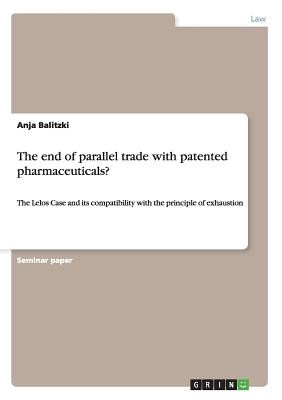
- We will send in 10–14 business days.
- Author: Anja Balitzki
- Publisher: GRIN Verlag
- Year: 2009
- Pages: 28
- ISBN-10: 3640454138
- ISBN-13: 9783640454136
- Format: 14.8 x 21 x 0.2 cm, minkšti viršeliai
- Language: English
- SAVE -10% with code: EXTRA
The end of parallel trade with patented pharmaceuticals? (e-book) (used book) | bookbook.eu
Reviews
Description
Seminar paper from the year 2009 in the subject Law - Media, Multimedia Law, Copyright, grade: 1,3, Carl von Ossietzky University of Oldenburg, language: English, abstract: The pharmaceutical sector is recently in the focus of the academic literature, as it becomes more and more an important topic on the European level. Especially the relationship between patent and competition law can lead to problems and is consistently discussed. In September 2008 the ECJ had to make a decision in a case between a pharmaceutical manufacturer and his distributors, in which both fields of law played an important role. Because of these recent developments the objective of this thesis is to analyse the current relation between patent and competition law by laying the emphasis on the phenomenon of parallel trade. This work will focus on the abovementioned Lelos Case and its implications for the principle of exhaustion. It does not deal with patent or competition law in detail, but contains the most important aspects in order to explain the consequences of the ECJ's decision. Furthermore, the aspect of costs for research and development cannot be described extensively, but will be mentioned with regard to Lelos. The reason for that is the predetermined length of the thesis and the specific question, which the author has developed as a result of the Lelos Case. At first the relevant conditions on the pharmaceutical market will be briefly shown (2.) in order to explain why especially in this sector parallel trade is such an important issue. Then, the general tension between patent and competition law will be described, by depicting the most important characteristics and jurisprudence in both fields of law (3.). The next chapter deals with the Lelos Case (4.). The decision to illustrate AG Colomer's opinion is the result of his different approach to the case in comparison to the point of view of the defendant (i.e. GlaxoSmithKline). After that, a result regarding the impact of the EC
EXTRA 10 % discount with code: EXTRA
The promotion ends in 23d.16:20:58
The discount code is valid when purchasing from 10 €. Discounts do not stack.
- Author: Anja Balitzki
- Publisher: GRIN Verlag
- Year: 2009
- Pages: 28
- ISBN-10: 3640454138
- ISBN-13: 9783640454136
- Format: 14.8 x 21 x 0.2 cm, minkšti viršeliai
- Language: English English
Seminar paper from the year 2009 in the subject Law - Media, Multimedia Law, Copyright, grade: 1,3, Carl von Ossietzky University of Oldenburg, language: English, abstract: The pharmaceutical sector is recently in the focus of the academic literature, as it becomes more and more an important topic on the European level. Especially the relationship between patent and competition law can lead to problems and is consistently discussed. In September 2008 the ECJ had to make a decision in a case between a pharmaceutical manufacturer and his distributors, in which both fields of law played an important role. Because of these recent developments the objective of this thesis is to analyse the current relation between patent and competition law by laying the emphasis on the phenomenon of parallel trade. This work will focus on the abovementioned Lelos Case and its implications for the principle of exhaustion. It does not deal with patent or competition law in detail, but contains the most important aspects in order to explain the consequences of the ECJ's decision. Furthermore, the aspect of costs for research and development cannot be described extensively, but will be mentioned with regard to Lelos. The reason for that is the predetermined length of the thesis and the specific question, which the author has developed as a result of the Lelos Case. At first the relevant conditions on the pharmaceutical market will be briefly shown (2.) in order to explain why especially in this sector parallel trade is such an important issue. Then, the general tension between patent and competition law will be described, by depicting the most important characteristics and jurisprudence in both fields of law (3.). The next chapter deals with the Lelos Case (4.). The decision to illustrate AG Colomer's opinion is the result of his different approach to the case in comparison to the point of view of the defendant (i.e. GlaxoSmithKline). After that, a result regarding the impact of the EC


Reviews